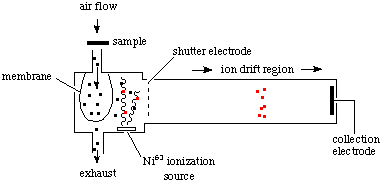
Organic Chemistry in "Real Life"
Have you recently been stuck in a long security line at the airport? Have you been pulled aside and had your hand luggage wiped with a small cloth that was then put into some kind of testing device? Do you know what they were doing? No? Here is your chance to find out!
Obviously, security measures at airports (and other locations) have become much more visible recently. This "swiping" of your luggage or other items is an attempt to detect traces of explosive materials, or narcotics and other illicit substances. The device that is used to detect these substances is called an Ion Mobility Spectrometer (IMS), and is very closely related to the mass spectrometer we discuss in class. A small cloth or paper "swipe" is wiped over the object (e.g. luggage handle) to be tested. The idea is that any small amount of organic substance, either as a pure chemical or a component of a mixture or a common impurity in a material that is being tested for (e.g. explosive or narcotic), is picked up on the "swipe cloth". Usually, only nanograms of a suitable organic material needs to be picked up on the swipe. The cloth is then subjected to analysis in the IMS. To see how this works, let's look at a schematic diagram of an IMS device.

The swipe sample is first heated to vaporize any organic compounds picked up. The organics are picked up by an air stream and swept into a sample chamber. Often the sample chamber contains a membrane to allow some physical method of separation of the organics from other particulate matter, water etc. The organics that pass through the membrane encounter an ionizing source, usually a radioactive nickel element. Often a "dopant" molecule that assists in the ionization process is added at this point. The process of ionization is related to that in mass spectrometry, and ions of the same kind are formed, shown as the red dots in the figure.
As in mass spectrometry, the ions are repelled down a drift tube using a charged "shutter" electrode. In IMS, however, this electrode is charged in a pulsed manner, so that the ions are launched down the tube in "bunches". When the ion bunch hits the collection electrode, a current pulse occurs, which is picked up by the system electronics. The time difference between the accelerating pulse and the collection pulse gives the time taken for the ions to "drift" down the tube. The term drift has a specific meaning in this case. Unlike mass spectrometry which takes place in a vacuum, IMS takes place at atmospheric pressure. As the ions travel from one electrode to the next, they suffer collisions with the gases in the tube, and quickly reach a terminal velocity that is characteristic of the particular ion that is being accelerated. Different organic ions have different drift times down the tube, and thus different organics on the swipe pad can be differentiated in this way.
IMS is much more convenient than mass spectrometry for several reasons. First it operates at atmospheric pressure, unlike mass spectrometry which requires a high vacuum. Second, the organics being detected are generally easy to ionize, and a less intense and compact ionization source can be used. IMS devices are small and much less costly than mass spectrometers. However, IMS is much less selective than mass spectrometry. Remember how mass spectrometry works. The ions are selected based on their mass in the presence of a variable magnetic field. This mass selection can be very accurate and is thus very selective. IMS selects between different compounds based on their drift time. This drift time may not be measured so accurately, and thus selectivity is decreased. In fact, it turns out that IMS devices are not as selective as a well trained dog! However, the machine works 24/7, is overall less expensive to operate etc. etc.
The IMS device has to be calibrated for the organic compound that is being detected, whether explosive component, narcotic etc. When the machine detects a compound with one of these calibrated drift times after a swipe of your luggage, you had better be prepared for a more "thorough" search!